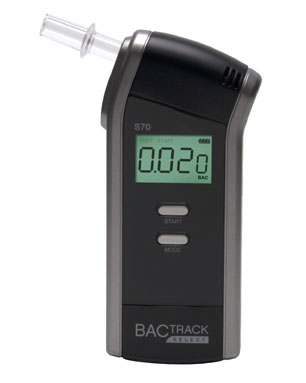Refusing a DWI Breathalizer or Blood Test — Generally
 In New York, there are two primary consequences of refusing a DWI breathalizer or to submit to a chemical test (e.g., a breath test or a blood test). First, the refusal generally can be used against you at trial as “consciousness of guilt” evidence. Second, the refusal is itself a civil violation — wholly independent of the DWI charge in criminal Court — which results in proceedings before a DMV Administrative Law Judge, and generally results in both (a) a significant driver’s license revocation, and (b) a civil penalty (i.e., a fine).
In New York, there are two primary consequences of refusing a DWI breathalizer or to submit to a chemical test (e.g., a breath test or a blood test). First, the refusal generally can be used against you at trial as “consciousness of guilt” evidence. Second, the refusal is itself a civil violation — wholly independent of the DWI charge in criminal Court — which results in proceedings before a DMV Administrative Law Judge, and generally results in both (a) a significant driver’s license revocation, and (b) a civil penalty (i.e., a fine).
Civil Sanctions for Chemical Test Refusal — First Offense
A chemical test refusal is considered to be a first offense if, within the past 5 years, you have neither (a) had your driving privileges revoked for refusing to submit to a chemical test, nor (b) been convicted of DWAI, DWI, Aggravated DWI, DWAI Drugs, DWAI Combined Influence (not arising out of the same incident).
The civil sanctions for refusing to submit to a chemical test as a first offense are:
Revocation of your driver’s license for 1 year (18 months if you have a CDL);
A civil penalty of $ 500; and
A driver responsibility assessment of $250 a year for 3 years (unless such assessment is already being paid based upon a DWAI, DWI, Aggravated DWI, DWAI Drugs or DWAI Combined Influence conviction arising out of the same incident).
Civil Sanctions for Chemical Test Refusal — Repeat Offenders
A chemical test refusal is considered to be a repeat offense if, within the past 5 years, you have either (a) had your driving privileges revoked for refusing to submit to a chemical test, or (b) been convicted of DWAI, DWI, Aggravated DWI, DWAI Drugs, DWAI Combined Influence or Zero Tolerance (not arising out of the same incident).
The civil sanctions for refusing to submit to a chemical test as a repeat offender are:
Revocation of your driver’s license for 18 months (at least 10 years if you have a CDL);
A civil penalty of $750 (unless the predicate was a violation of the Zero Tolerance Law, in which case the civil penalty is $500); and
A driver responsibility assessment of $250 a year for 3 years (unless such assessment is already being paid based upon a DWAI, DWI, Aggravated DWI, DWAI Drugs or DWAI Combined Influence conviction arising out of the same incident).
In addition, DMV will require evidence of alcohol evaluation and/or rehabilitation before it will ever relicense you.
Chemical Test Refusal Revocation — Underage Offenders
If you are under 21 and are found to have refused to submit to a chemical test as a first offense, your driver’s license will be revoked for 1 year. If you have a prior refusal or a conviction of DWAI, DWI, Aggravated DWI, DWAI Drugs, DWAI Combined Influence or Zero Tolerance, your driver’s license will be revoked for at least 1 year or until you turn 21, whichever is longer.
Chemical Test Refusal Revocation Runs Separate and Apart From Suspension/Revocation for DWI/DWAI
The license revocation for a chemical test refusal is a “civil” or “administrative” penalty separate and distinct from the license suspension/revocation, which results from a DWAI,
DWI, Aggravated DWI, DWAI Drugs or DWAI Combined Influence conviction in criminal Court. As such, the suspension/revocation periods run separate and apart from each other to the extent that they do not overlap.
In other words, to the extent that a DWAI, DWI, Aggravated DWI, DWAI Drugs or DWAI Combined Influence suspension/revocation and a chemical test refusal revocation overlap, DMV runs the suspension/revocation periods concurrently. By contrast, to the extent that the suspension/revocation periods do not overlap, DMV runs the suspension/revocation periods consecutively.
Should You Refuse to Submit to a Chemical Test?
There is no simple answer (or even necessarily a correct answer) to the question of whether you should submit to a chemical test in a given situation — a question which usually arises in the middle of the night! The answer depends upon many factors, such as whether there has been an accident involving serious physical injury or death, whether the DWI charge is a felony, whether you are a repeat/multiple offender, whether you need to drive to earn a living, whether you have a commercial driver’s license, whether the test result is likely to be above the legal limit, whether there is a plea bargaining policy in the county in which you are arrested with regard to test refusals and/or BAC limits (e.g., no reduction to DWAI if the defendant’s BAC is above .13%), etc.
The following are some general guidelines – but understand the answer is substantially more complicated than this, and requires the advice of counsel on a case-by-case basis.
If there has been an accident involving serious physical injury or death — refuse the test
If the DWI charge is a felony — refuse the test
In virtually every other situation — take the test
DMV Refusal Hearing
If you refuse to submit to a chemical test, you have the right to a Due Process hearing before a DMV Administrative Law Judge. Although the odds are certainly against you at the hearing, such hearings are definitely winnable — and can also provide critical information with regard to your DWI case in criminal Court (if the case is still pending).
Contact Anthony J. Lana for professional and confidential assistance with any DWI-related charges.
